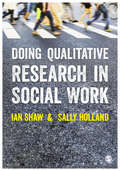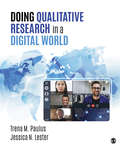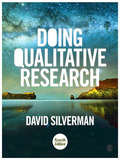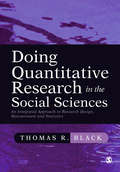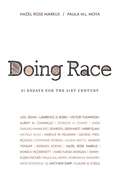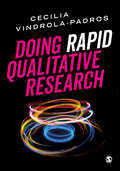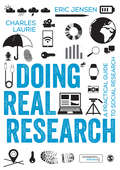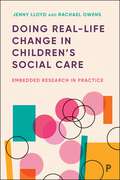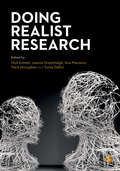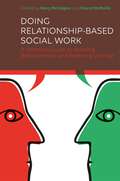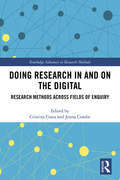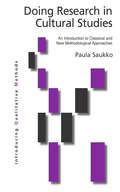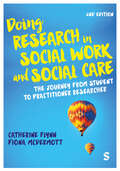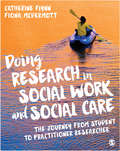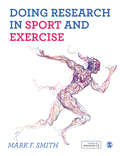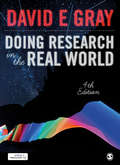- Table View
- List View
Doing Qualitative Research in Social Work
by Sally Holland Mr Ian Graham ShawBringing key developments and debates together in a single volume, this book provides an authoritative guide for students and practitioners embarking on qualitative research in social work and related fields. Frequently illustrated with contemporary and classic case examples from the authors' own empirical research and from international published work, and with self-directed learning tasks, the book provides insight into the difficulties and complexities of carrying out research, as well as sharing 'success' stories from the field. Shaw and Holland have long experience of writing for practitioners and students and in making complex concepts accessible and readable, making this an ideal text for those engaging in qualitative social work research at any level. Ian Shaw is a Professor of Social Work at the University of York and at the University of Aalborg. Sally Holland is a Reader in Social Work at the School of Social Sciences in Cardiff University.
Doing Qualitative Research in a Digital World
by Jessica Nina Lester Trena M. PaulusWhile some qualitative methods texts touch upon online communities as a potential data source, show how to conduct interviews and focus groups online, or select recording devices and analysis software, no book to date has guided readers in the creation of a comprehensive digital workflow for their research. By working through each chapter in this book, readers will be able to generate a unique digital workflow for designing and implementing their research. The book provides a deep exploration of the relationship between theories of technology, substantive theories, and methodological theory, and shows how together these inform the development of a quality research design. The authors include vignettes—narratives written by qualitative researchers describing cutting-edge use of digital tools and spaces—and also give examples of published studies, which together provide practical illustration of the content. Woven throughout is explicit attention to ethical challenges that are likely to be faced by researchers when adopting digital tools. The book invites readers to engage in a critical appraisal of the role of technology in qualitative research through reflection, conversation, and engagement with the larger community of researchers.
Doing Qualitative Research in a Digital World
by Jessica Nina Lester Trena M. PaulusWhile some qualitative methods texts touch upon online communities as a potential data source, show how to conduct interviews and focus groups online, or select recording devices and analysis software, no book to date has guided readers in the creation of a comprehensive digital workflow for their research. By working through each chapter in this book, readers will be able to generate a unique digital workflow for designing and implementing their research. The book provides a deep exploration of the relationship between theories of technology, substantive theories, and methodological theory, and shows how together these inform the development of a quality research design. The authors include vignettes—narratives written by qualitative researchers describing cutting-edge use of digital tools and spaces—and also give examples of published studies, which together provide practical illustration of the content. Woven throughout is explicit attention to ethical challenges that are likely to be faced by researchers when adopting digital tools. The book invites readers to engage in a critical appraisal of the role of technology in qualitative research through reflection, conversation, and engagement with the larger community of researchers.
Doing Qualitative Research: A Practical Handbook
by David SilvermanIn the fourth edition of his best-selling textbook, David Silverman provides a step-by-step guide to planning and conducting qualitative research. Using real examples from real postgraduate students, the book makes it easy to link theory to methods and shows how to move from understanding the principles of qualitative research to doing it yourself. The new edition has been fully updated and now includes: - a brand new chapter on formulating a research question appropriate for qualitative research - an expanded discussion of the role of theory in research - extended discussion of case study research and the number of cases needed for effective qualitative research - further coverage of focus groups and analysing internet data - new student examples from around the world - a new section on the common pitfalls encountered in qualitative research - an expanded companion website with more student examples and videos. Filled with exercises to test your understanding and develop your skills, as well as David's own tips for research success based on years of experience, this book is essential reading for anyone doing qualitative research.
Doing Quantitative Research in the Social Sciences: An Integrated Approach to Research Design, Measurement and Statistics (Statistics Ser.)
by Dr Thomas R. BlackThis original textbook provides a comprehensive and integrated approach to using quantitative methods in the social sciences. Thomas R Black guides the student and researcher through the minefield of potential problems that may be confronted, and it is this emphasis on the practical that distinguishes his book from others which focus exclusively on either research design and measurement or statistical methods. Focusing on the design and execution of research, key topics such as planning, sampling, the design of measuring instruments, choice of statistical text and interpretation of results are examined within the context of the research process. In a lively and accessible style, the student is introduced to researc design issues alongside statistical procedures and encouraged to develop analytical and decision-making skills.
Doing Quantitative Research in the Social Sciences: An Integrated Approach to Research Design, Measurement and Statistics (Statistics Ser.)
by Thomas R. BlackThis original textbook provides a comprehensive and integrated approach to using quantitative methods in the social sciences. Thomas R Black guides the student and researcher through the minefield of potential problems that may be confronted, and it is this emphasis on the practical that distinguishes his book from others which focus exclusively on either research design and measurement or statistical methods. Focusing on the design and execution of research, key topics such as planning, sampling, the design of measuring instruments, choice of statistical text and interpretation of results are examined within the context of the research process. In a lively and accessible style, the student is introduced to researc design issues alongside statistical procedures and encouraged to develop analytical and decision-making skills.
Doing Race: 21 Essays for the 21st Century
by Hazel Rose Markus Paula M. L. MoyaA collection of new essays by an interdisciplinary team of authors that gives a comprehensive introduction to race and ethnicity. Doing Race focuses on race and ethnicity in everyday life: what they are, how they work, and why they matter. Going to school and work, renting an apartment or buying a house, watching television, voting, listening to music, reading books and newspapers, attending religious services, and going to the doctor are all everyday activities that are influenced by assumptions about who counts, whom to trust, whom to care about, whom to include, and why. Race and ethnicity are powerful precisely because they organize modern society and play a large role in fueling violence around the globe.
Doing Rapid Qualitative Research
by Cecilia Vindrola-PadrosIf you are working in a time-sensitive context, need to deliver research findings so they can be used to inform decisions, or are finding it difficult to access research funding for long-term qualitative research, this book will help you. Introducing ‘rapid qualitative research’, it demonstrates how you can conduct high quality qualitative research within time, access and resource constraints. The book uses real world examples to illustrate the benefits and challenges of using rapid qualitative research designs. Focusing on the when, why and how, it explains the difference between cutting corners and making quick, well-informed research choices that support rigorous, credible research. Key features of the book include discussion questions and exercises for you to reflect on and apply your learning, as well as two case study chapters of real-world research so you can see rapid research in action. Written by the world’s leading expert on this subject, this book contains the theoretical and practical nuts and bolts you need to reframe existing qualitative methods, speed up your research, and make tangible contributions to your field. It is the perfect companion for any researcher, final-year undergraduate or postgraduate student looking to conduct rapid, but rigorous, qualitative research.
Doing Rapid Qualitative Research
by Cecilia Vindrola-PadrosIf you are working in a time-sensitive context, need to deliver research findings so they can be used to inform decisions, or are finding it difficult to access research funding for long-term qualitative research, this book will help you. Introducing ‘rapid qualitative research’, it demonstrates how you can conduct high quality qualitative research within time, access and resource constraints. The book uses real world examples to illustrate the benefits and challenges of using rapid qualitative research designs. Focusing on the when, why and how, it explains the difference between cutting corners and making quick, well-informed research choices that support rigorous, credible research. Key features of the book include discussion questions and exercises for you to reflect on and apply your learning, as well as two case study chapters of real-world research so you can see rapid research in action. Written by the world’s leading expert on this subject, this book contains the theoretical and practical nuts and bolts you need to reframe existing qualitative methods, speed up your research, and make tangible contributions to your field. It is the perfect companion for any researcher, final-year undergraduate or postgraduate student looking to conduct rapid, but rigorous, qualitative research.
Doing Real Research: A Practical Guide to Social Research
by Professor Eric Jensen Charles LaurieChallenging the formality and idealized settings of conventional methods teaching and opting instead for a real world approach to social research, this book offers frank, practical advice designed to empower students and researchers alike. Theoretically robust and with an exhaustive coverage of key methodologies and methods the title establishes the cornerstones of social research. Examples reflect research conducted inside and outside formal university settings and range from the extremes of war torn countries to the complexities of school classrooms. Supported by a wealth of learning features and tools the textbook and website include: Video top tips Podcasts Full text journal articles Interviews with researchers conducting field research Links to external websites and blogs Student exercises Real world case studies
Doing Real Research: A Practical Guide to Social Research
by Professor Eric Jensen Charles LaurieChallenging the formality and idealized settings of conventional methods teaching and opting instead for a real world approach to social research this book offers frank, practical advice designed to empower students and researchers alike. Theoretically robust and with an exhaustive coverage of key methodologies and methods the title establishes the cornerstones of social research. Examples reflect research conducted inside and outside formal university settings and range from the extremes of war torn countries to the complexities of school classrooms. Supported by a wealth of learning features and tools the textbook and website include: · Video top tips · Podcasts · Full text journal articles · Interviews with researchers conducting field research · Links to external websites and blogs · Student exercises · Real world case studies
Doing Real-Life Change in Children’s Social Care: Embedded Research in Practice
by Jenny Lloyd Rachael OwensAll too often, human systems are criticised for failing those they are meant to serve. One example is the growing awareness of the overlooked needs of adolescents facing harm in their communities. This has highlighted a need for new systems that enable practice that is ethical, effective and grounded in supportive relationships. But how can this be achieved? Appealing to those interested in Contextual Safeguarding and beyond, this book shares ‘real-life’ lessons from research, covering: • Practical guidance and tools for changing systems using embedded methods; • Navigating complex relationships and emotions in organisational change; and • Using theory and concepts to support change. The book’s lively and creative style makes it accessible for researchers, students, professionals and anyone committed to system change in children’s social care.
Doing Realist Research
by Nick Emmel Joanne Greenhalgh Ana Manzano Mark Monaghan Sonia DalkinBringing together leading theorists, researchers and policy makers with expertise in using realist methods, this book is a definitive guide to putting realist methodologies into practice. Not just an overview of the field, this book looks to extend current debates and apply realist methods to new and practical challenges in social research. Featuring practical, worked examples of how to turn theory into evidence, it empowers readers not just to understand realist methods, but to use them. It will help readers: - Negotiate the complexity of relational systems - Understand the importance and relevance of cumulative theory - Address concerns over data sources and quality - Be flexible and creative in realist approaches - Produce useful evidence for policy. Sophisticated and globally minded, this book is the perfect addition to the ongoing development and application of realist methods across evaluation, synthesis, and social research.
Doing Realist Research
by Nick Emmel Joanne Greenhalgh Ana Manzano Mark Monaghan Sonia DalkinBringing together leading theorists, researchers and policy makers with expertise in using realist methods, this book is a definitive guide to putting realist methodologies into practice. Not just an overview of the field, this book looks to extend current debates and apply realist methods to new and practical challenges in social research. Featuring practical, worked examples of how to turn theory into evidence, it empowers readers not just to understand realist methods, but to use them. It will help readers: - Negotiate the complexity of relational systems - Understand the importance and relevance of cumulative theory - Address concerns over data sources and quality - Be flexible and creative in realist approaches - Produce useful evidence for policy. Sophisticated and globally minded, this book is the perfect addition to the ongoing development and application of realist methods across evaluation, synthesis, and social research.
Doing Relationship-Based Social Work: A Practical Guide to Building Relationships and Enabling Change
by James Marshall Stephen Clarke Paul Harvey Adrian Mckinney Brenda Horgan Cheryl Mcmullin Denise Macdermott Geraldine Campbell James Todd John Mclaughlin Julia Alexander Lynn Connor Maria Somerville Mary Henihan Mary Mccolgan Siobhan Wylie Susannah Mccall Uel McilveenRelationships and communication are the foundation of good social work practice. This book offers a new model, drawn from research and practical experience, which describes how to carry out effective relationship-based social work. Doing Relationship-Based Social Work provides a refreshing and realistic approach to social work practice. The model itself is built around four stages: engagement, negotiation, enabling change and valuing endings. Underpinned by motivational interviewing techniques, strengths focused practice, emotional intelligence and empowerment, the approach is supported by case examples and explanations of the importance of relationships at each stage. Informative and practical, this book will be an invaluable text for undergraduate and postgraduate social work students as well as all social work and allied professionals committed to enabling positive change.
Doing Research In and On the Digital: Research Methods across Fields of Inquiry (Routledge Advances in Research Methods)
by Cristina Costa Jenna CondieAs a social space, the web provides researchers both with a tool and an environment to explore the intricacies of everyday life. As a site of mediated interactions and interrelationships, the ‘digital’ has evolved from being a space of information to a space of creation, thus providing new opportunities regarding how, where and, why to conduct social research. Doing Research In and On the Digital aims to deliver on two fronts: first, by detailing how researchers are devising and applying innovative research methods for and within the digital sphere, and, secondly, by discussing the ethical challenges and issues implied and encountered in such approaches. In two core Parts, this collection explores: content collection: methods for harvesting digital data engaging research informants: digital participatory methods and data stories . With contributions from a diverse range of fields such as anthropology, sociology, education, healthcare and psychology, this volume will particularly appeal to post-graduate students and early career researchers who are navigating through new terrain in their digital-mediated research endeavours.
Doing Research in Cultural Studies: An Introduction to Classical and New Methodological Approaches (Introducing Qualitative Methods)
by Dr Paula Saukko`This book is a goldmine for students...it is brilliantly conceptualized and brilliantly executed. With this book cultural studies finally comes of age methodologically' - Professor Norman K Denzin, Institute of Communications Research, University of Illinois Doing Research in Cultural Studies outlines the key methodological approaches to the study of lived experience, texts and social contexts within the field of cultural studies. It offers a comprehensive discussion of classical methodologies and introduces the reader to more contemporary debates that have argued for new ethnographic, poststructuralist and multi-scape research methods. Through a detailed yet concise explanation, the reader is shown how these methodologies work and how their outcomes may be interpreted. Key features of the book include: - An innovative framework - combining different methodologies and approaches. - A variety of `real-life' examples and case studies - enriches the book for the reader - A set of practical exercises in each chapter - pedagogical and student-focused throughout. The book has a flowing narrative and student-friendly structure which make it accessible to and popular with students, while the discussion of fresh approaches makes it also of interest to experienced researchers. It contains all the ingredients necessary to help the reader attain a solid grasp of analytical and practical challenges to doing effective research in cultural studies today.
Doing Research in Social Work and Social Care: The Journey from Student to Practitioner Researcher
by Fiona McDermott Catherine FlynnDo you want to understand how best to embrace the challenges, surprises, and successes of research? This book acts as a journey through research to empower you to make the necessary connections between research and professional practice. From understanding the concepts of research and gathering data, to guiding you in writing it up and achieving positive change, this book will give you: · a confident start with clarity on core concepts and getting it right ethically. · an insight into diversity in approaches, the impact of context, and how to overcome problems. · A better understanding of the realities of social work and social care practice. · Step-by-step guidance at each point in the research process Equipped with a wealth of case studies and real-world examples to help you put your knowledge into practice, this book is the perfect companion for students who want to transition to successful practitioner researchers.
Doing Research in Social Work and Social Care: The Journey from Student to Practitioner Researcher
by Catherine Flynn Fiona McDermottDo you want to understand how best to embrace the challenges, surprises, and successes of research? This book acts as a journey through research to empower you to make the necessary connections between research and professional practice. From understanding the concepts of research and gathering data, to guiding you in writing it up and achieving positive change, this book will give you: · a confident start with clarity on core concepts and getting it right ethically. · an insight into diversity in approaches, the impact of context, and how to overcome problems. · A better understanding of the realities of social work and social care practice. · Step-by-step guidance at each point in the research process Equipped with a wealth of case studies and real-world examples to help you put your knowledge into practice, this book is the perfect companion for students who want to transition to successful practitioner researchers.
Doing Research in Social Work and Social Care: The Journey from Student to Practitioner Researcher
by Dr Catherine Flynn Fiona McDermottFrom understanding the concepts of research and gathering data, to writing it all up and sharing knowledge, this book will guide your students to become researchers by giving them: a confident start with clarity on core concepts and getting it right ethically step-by-step guidance at each point in the research process, showing them diversity in approaches, the impact of context and how to overcome problems case studies of how real researchers embrace the challenges, surprises and successes of research an emphasis on the person in context, so their research is reflective of the realities of social work and social care practice a guide to writing it up and achieving impact and positive change with research.
Doing Research in Social Work and Social Care: The Journey from Student to Practitioner Researcher
by Fiona Mcdermott Dr Catherine FlynnFrom understanding the concepts of research and gathering data, to writing it all up and sharing knowledge, this book will guide your students to become researchers by giving them: a confident start with clarity on core concepts and getting it right ethically step-by-step guidance at each point in the research process, showing them diversity in approaches, the impact of context and how to overcome problems case studies of how real researchers embrace the challenges, surprises and successes of research an emphasis on the person in context, so their research is reflective of the realities of social work and social care practice a guide to writing it up and achieving impact and positive change with research.
Doing Research in Sport and Exercise: A Student′s Guide
by Mark SmithSplit into five sections that cover your whole research journey, this book captures everything you need to understand to do a sports research project. From getting started with a research question and selecting a research approach to choosing a method of data collection and analysing and presenting research findings, it walks you step-by-step through the entire research process. The book also: Showcases a diverse range of approaches, including experiments, surveys, focus groups, interviews, systematic reviews and mixed methods, to help you choose the best option for your project. Focuses on applied research, showing you how to go beyond the classroom, conduct research in the field and manage and analyse data in the real world. Explores how your supervisor can support you to get the most out of your project. Features include over 40 student activities that encourage you to think more deeply about what you′ve learned, nearly 50 case studies highlighting research from real-world students and sport researchers, and reflection points, to help you check your understanding. For students across courses relating to Sport & Exercise Science, Coaching Practice & Development, PE and Sport, this book is a down-to-earth guide to help anyone doing a research project in sport and exercise.
Doing Research in Sport and Exercise: A Student′s Guide
by Mark SmithSplit into five sections that cover your whole research journey, this book captures everything you need to understand to do a sports research project. From getting started with a research question and selecting a research approach to choosing a method of data collection and analysing and presenting research findings, it walks you step-by-step through the entire research process. The book also: Showcases a diverse range of approaches, including experiments, surveys, focus groups, interviews, systematic reviews and mixed methods, to help you choose the best option for your project. Focuses on applied research, showing you how to go beyond the classroom, conduct research in the field and manage and analyse data in the real world. Explores how your supervisor can support you to get the most out of your project. Features include over 40 student activities that encourage you to think more deeply about what you′ve learned, nearly 50 case studies highlighting research from real-world students and sport researchers, and reflection points, to help you check your understanding. For students across courses relating to Sport & Exercise Science, Coaching Practice & Development, PE and Sport, this book is a down-to-earth guide to help anyone doing a research project in sport and exercise.
Doing Research in the Real World
by David E GrayGet 12 months FREE access to an interactive eBook when purchasing the paperback* Lecturers, request your electronic inspection copy here. Pragmatic and inspiring, this applied book will help you to complete your research quickly and well. David Gray’s advice is both positive and sensible as he walks you through each step of the research process from start to finish. Weaving quantitative, qualitative, and mixed methods together, he encourages you to consider flexible options and to choose the most appropriate methods for your projects. Setting out the realities of conducting research in real-world settings, David will help you to find the practical tools – and the confidence – you need to make good research choices as well as providing coverage of a wide range of assessment techniques and employability skills. The book also introduces an incredible range of digital resources: · Award-winning video to bring concepts to life · Video top tips from David · Case studies from experts · Journal articles to showcase real research · Interactive glossary flashcards · Multiple choice questions to test yourself with · Multidisciplinary data sets · Downloadable checklists to guide you. Brimming with energy and grounded in reality, this book is still your definitive companion to research – from theory to design, data collection to data analysis and writing up to dissemination this book has everything you need to excel. *Interactivity only available through Vitalsource eBook included as part of paperback product (ISBN 9781526418524). Access not guaranteed on second-hand copies (as access code may have previously been redeemed).
Doing Research in the Real World
by David E GrayGet 12 months FREE access to an interactive eBook when purchasing the paperback* Lecturers, request your electronic inspection copy here. Pragmatic and inspiring, this applied book will help you to complete your research quickly and well. David Gray’s advice is both positive and sensible as he walks you through each step of the research process from start to finish. Weaving quantitative, qualitative, and mixed methods together, he encourages you to consider flexible options and to choose the most appropriate methods for your projects. Setting out the realities of conducting research in real-world settings, David will help you to find the practical tools – and the confidence – you need to make good research choices as well as providing coverage of a wide range of assessment techniques and employability skills. The book also introduces an incredible range of digital resources: · Award-winning video to bring concepts to life · Video top tips from David · Case studies from experts · Journal articles to showcase real research · Interactive glossary flashcards · Multiple choice questions to test yourself with · Multidisciplinary data sets · Downloadable checklists to guide you. Brimming with energy and grounded in reality, this book is still your definitive companion to research – from theory to design, data collection to data analysis and writing up to dissemination this book has everything you need to excel. *Interactivity only available through Vitalsource eBook included as part of paperback product (ISBN 9781526418524). Access not guaranteed on second-hand copies (as access code may have previously been redeemed).
